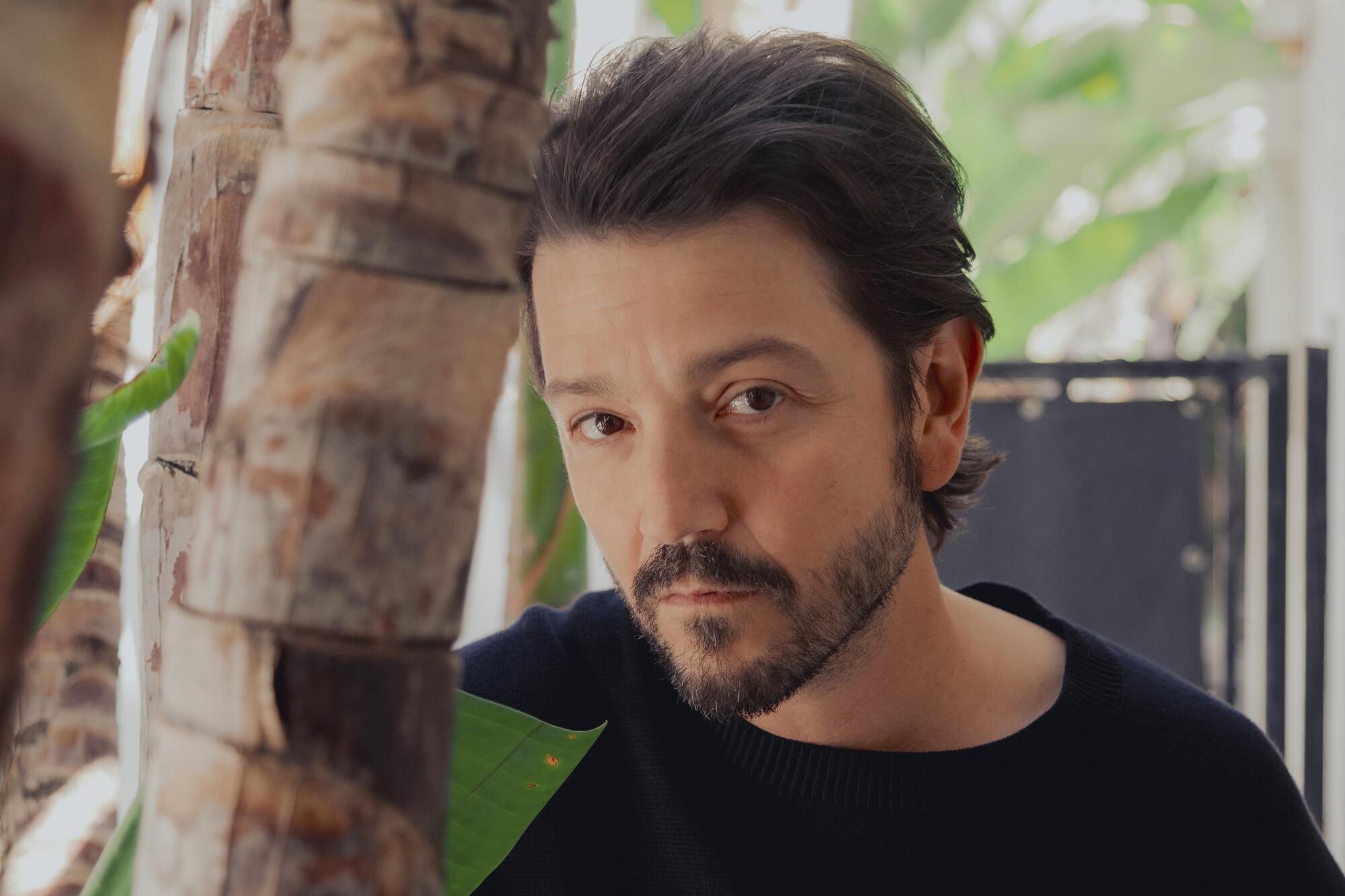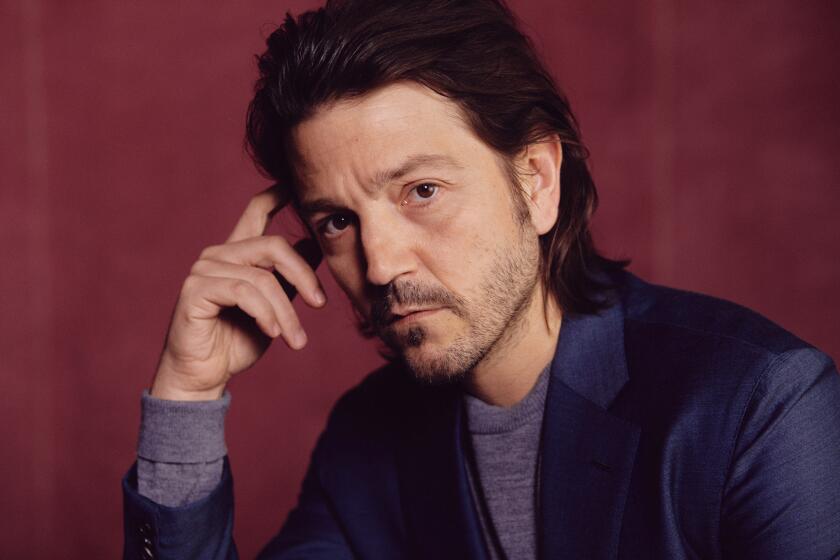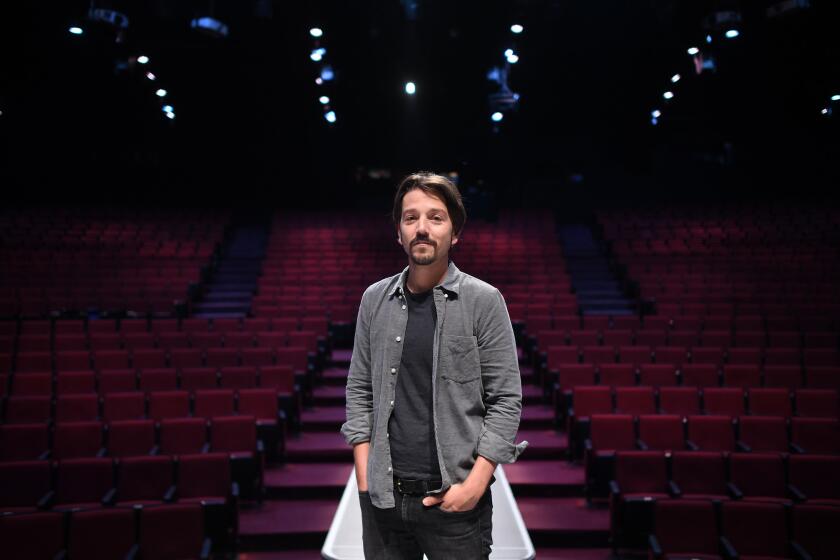
Diego Luna is thinking about time a lot lately. How it’s passing. And how it’s spent.
His latest project, “La Máquina,” which premieres Oct. 9 on Hulu and is the streamer’s first Spanish-language series, was first dreamed up by Luna and his longtime friend and collaborator, Gael García Bernal, as a feature film project more than a decade ago. But as the years wore on, the chance to turn this boxing story into a thrilling episodic series felt both obvious and exciting.
“I’m glad it took us time,” Luna tells The Times on a sunny afternoon in September at the Chateau Marmont. “Because I think the opportunity to talk about the career of a boxer and the relationship between him and his manager at the end of his career is really strong. It serves, in many ways, to reflect and establish parallels between that and what we go through as actors. In our careers. In our journey in this business.”
Esteban (García Bernal) knows his days as a professional boxer — as “La Máquina” — are numbered. He can’t continue chasing the glory of years past. His body can’t keep up. Neither can his mind.
The Mexican actors and friends reunite for Hulu’s Spanish-language series that centers on an aging boxer and his manager, who gets him one more fight.
For his manager, Andy (Luna), that’s clearly a problem. And so, after Esteban loses a key fight against a famed newcomer, Andy insists on launching a comeback. The decision proves dangerous as both men end up at the mercy of unseen forces intent on getting payment for a debt incurred years before that helped make “La Máquina” into the celebrated and lucrative fighter he is. Or was.

Written by Marco Ramirez, who serves as showrunner, and directed by Gabriel Ripstein, the series lays out a world of sporting corruption in Mexico. But at its heart “La Máquina” is a show about learning how to let go, about how to stop fighting the passing of time and embrace instead the changes you can still make in your life.
“I’m capable of doing this because now I can talk about aging,” Luna, 44, explains. “Because I’m there. I have kids. My son is 16. My daughter is 14. When I look at them, I realize it’s been a while since I’ve been here. When I talk about my career, I’m talking about stuff I did more than 25 years ago. It’s a long time.”
Gazing backward, while focused on the possibilities of a future at hand, fuels Luna. The “Y Tu Mamá También” and “Andor” actor has long understood his role as an artist to be rooted in conscientiously mirroring the world around him and the many colorful characters that inhabit it.
“Andor” executive producer Diego Luna discusses the show’s Emmy nomination for best drama series, working amid the writers’ strike and what to expect from Season 2.
Andy is a man as tragic as he is absurd. He’s an insecure mama’s boy who desperately works to make himself into the type of guy who’ll be wanted and respected.
“I think this character is gonna make you laugh till you go, ‘Oh, wait a second. What’s going on here?’” Luna says.
That’s nowhere clearer than in the first episode where we witness Andy’s early-morning routine: We watch him put on his hair piece and apply spray tan. We watch him psych himself up in front of the mirror and even do his own lip injections — all while rocking out to Christian Castro’s “No podrás.”
The montage is one of Luna’s favorite moments on the show, “because we’re establishing that there was a moment where he was there, but then he hid behind this mask. This is his process. I think it serves as a great metaphor of how wrong it is to try to let that machinery of popularity define your success. Today we make a business of our privacy. And this guy is performing 24/7.”

Luna is nearly unrecognizable in the part. For an actor who has long leveraged his baby-faced looks to play everything from lustful teenagers and rabble rousers to narcos and soccer players, his portrayal of Andy marks a departure for the actor.
“If we were gonna have the opportunity to be in control of the next project we were doing together, I was gonna ask myself to do something very different,” he says about conceiving the project with García Bernal. “I was going to take a risk. I wanted to put myself in a very uncomfortable situation.”
Only he couldn’t have anticipated just how uncomfortable playing Andy would be.
“Every day was painful,” he says, in between laughter. “It was hours in the chair. These prosthetics don’t let your skin breathe. Basically you’re suffocating yourself and your skin. I couldn’t eat. And because of the lips, I had to use a straw. So I was having shakes all day long.”
Five years ago, actor Diego Luna was living the Hollywood dream.
What helped was having a close friend as a scene partner. “That the person in front of you actually gets it doesn’t happen often,” Luna says.
Calling from London, García Bernal agrees. “At the beginning when we started working [together], we thought this was something that happened with everybody. And then we realized, no, it’s actually quite unique,” he says.
The two have known each other since they were kids. Their mothers were friends and colleagues who raised both boys in the theater world, which encourages play and make-believe. “It’s very special because we are family first,” Luna adds.
But what they have remains ineffable. “I don’t know what it is, and it’s better maybe not to know, better to maybe surprise ourselves every time,” García Bernal says. “We both understand what we do as an act of freedom. As an act of getting to know oneself, of trying to appeal to some sort of transcendence. And what is nice is to see how that is shaped with another — the same meaning, but with a different poetic than mine.”

“La Máquina” continues Luna’s commitment to producing work that makes audiences sit up and pay attention. A subplot of the series centers on Esteban’s ex-wife, Irasema (Eiza González). She’s a reporter intent on uncovering the truth behind the many rigged matches that have come to dominate the sport, a quest that puts her and her family in harm’s way.
“I’ve always been worried about what happens and what’s going on,” Luna says. “I’ve always tried to find out how to be useful, how to belong to something I could feel proud of.”
Such convictions bear out in the many projects Luna has produced throughout his career and most recently that are under the banner of his and García Bernal’s production company, La Corriente del Golfo. That includes their latest project, Santiago Maza’s documentary “State of Silence,” which premiered at Tribeca Film Festival in June. Luna has shepherded the film since 2019, when he was approached to back a project about the dangers journalists in Mexico face in speaking truth to power.
Maza, who worked on the actor’s dinner table docuseries “Pan y Circo,” has found in Luna a principled collaborator. One whose rabid curiosity about the world is inspiring.
“I was impressed back then with how well informed he was,” says Maza over Zoom about their first meeting. “I think now I understand why. I know his habits: all the time he’s reading news or listening to the radio. I recall that when we were talking about politics and things I was like, ‘Man, this guy knows his stuff.’”
“State of Silence” was originally conceived as a series. Luna funded the pilot but found no network that would produce it. By 2022, Maza had reworked the project into a feature-length film funded independently by Corriente del Golfo, with help from the Ford Foundation and Luminate.
Recently acquired by Netflix, the documentary offers a harrowing and urgent portrait of the violence journalists in Mexico have come to expect when reporting on everything from cartel shootings to local corruption. That it arrives the same year as “La Máquina” speaks to the type of work Luna devotes his time to.
“Diego and Gael know about this,” Maza shares. “They’ve done this their entire careers — how to make entertainment that can also nurture us, inform us and that can raise awareness. These are two projects now that, while they may not look too similar, they help paint a portrait of contemporary Mexico.”
If Luna’s career is driven by a tenet, it’s the belief that the stories he tells matter and that the work demands he be invested in what it can say.
“You spend so much time thinking of it, convincing others to do it, then doing it, then promoting it,” Luna says. “So it should matter.”
“I do believe that specific stories can change your perception. I think that is something you remind yourself every time you approach this job: You might be participating in something that will give hope to others and that will make you proud,” he says. “In that search, you can miss many times, obviously. And you will miss many times. But it’s the search that matters.”
More to Read
The complete guide to home viewing
Get Screen Gab for everything about the TV shows and streaming movies everyone’s talking about.
You may occasionally receive promotional content from the Los Angeles Times.









